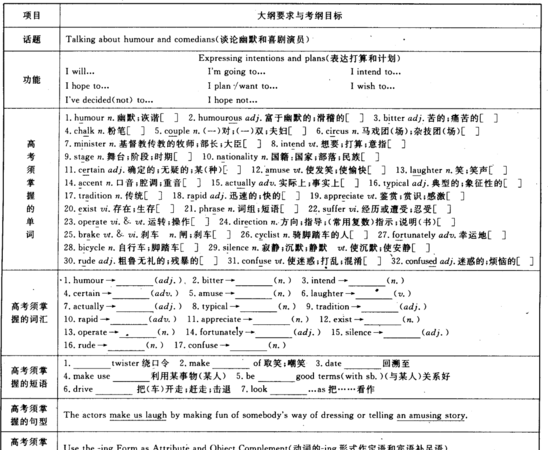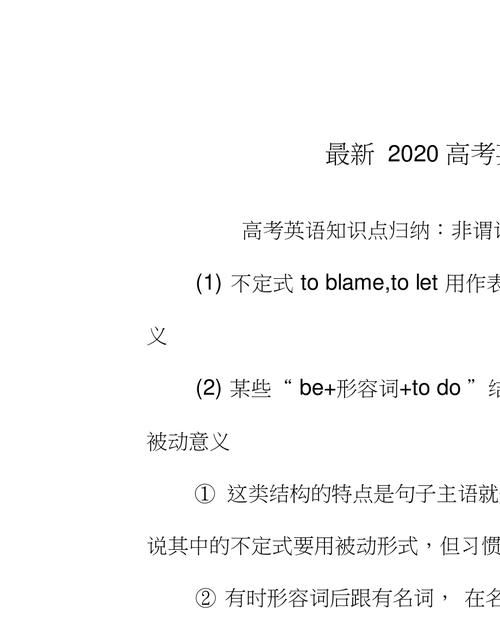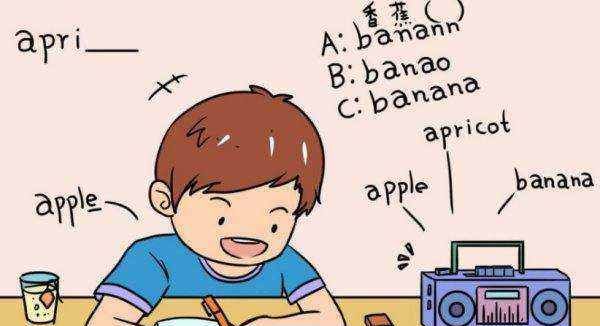本文目录
高考英语必备语法知识汇总
高考是最全面系统的一次考试,英语科目的高考考察就是我们学生平时学过的知识和掌握的语法知识。下面是我为大家整理的高考英语必备的语法与知识点,希望对大家有用!
高考英语语法知识点
一般过去时
①一般过去时的基本用法:表示过去的事情、动作或状态常与表示过去具体的时间状语连用(或有上下文语境暗示);用于表达过去的习惯;表示说话人原来没有料到、想到或希望的事通常用过去式。如:
I met her in the street yesterday.
I once saw the famous star here.
They never drank wine.
I thought the film would be interesting,but it isn’t.
②如果从句中有一个过去的时间状语,尽管从句中的动作先于主句发生,但从句中的谓语动词连用过去式。如:
③表示两个紧接着发生的动作,常由以下词语连接,用一般过去时。如:but, and, when, as soon as, immediately, the moment, the minute。
The moment she came in, she told me what had happened to her.
He bought a watch but lost it.
④常用一般过去时的句型:
Why didn’t you / I think of that?
I didn’t notice it.
I forgot to tell you I had been there with my brother before.
I didn’t recognize him.
高考英语知识要点
1.表示“大量、许多”
可数:number/many/dozen/a great number 不可数:a great deal/amount/much 都可以:plenty of/lot/quantity/mass
2.可以修饰形容词比较级:far/even/any/much/rather/a bit/a lot
3.lie躺-lay-lain-lying 撒谎-lied-lied-lying
Lay下蛋-laid-laid-laying
4.can表示能力,be able to表示经过努力,有时态变化
5.receive强调客观接收,accept强调主观接受
6.on account of因为,由于;account for说明原因解释
7.accuse sb of指控某人,sue指控
8.add to增加扩大,add up加起来,add up to总共总计
9.afford负担得起,抽得出时间
10.after以过去为起点,用于过去时态,in以将来为起点,用于将来时态
11.ago与过去时连用,before与过去完成时连用
12.in all总计全部,all in all总的说来,at all一点,not at all一点也不
13.almost后接no,none,nothing,never,但不能用not修饰,nearly可以用not修饰 more than和too等词前面用almost,不用nearly
14.always与not连用表示未必、有时,例如Crows are not always black.乌鸦未必是黑 色的。
15.be amused at/by/with以?为乐
16.announce指个人郑重其事的宣布,declare指宣布战争、和平、意见、中立等 Declare后不加不定式
17.表示渴望:long for/be anxious for/in anxiety of/have an appetite for/be eager to do/hunger for/sick for;为某事担忧be anxious about
高考英语知识点
(一)段首句
1. 关于??人们有不同的观点。一些人认为??
There are different opinions among people as to ____ .Some people suggest that ____.
2. 俗话说(常言道)??,它是我们前辈的经历,但是,即使在今天,它在许多场合仍然适用。
There is an old saying______. It"s the experience of our forefathers,however,it is correct in many cases even today.
3. 现在,??,它们给我们的日常生活带来了许多危害。首先,??;其次,??。更为糟糕的是??。
Today, ____, which have brought a lot of harms in our daily life. First, ____ Second,____. What makes things worse is that______.
4. 现在,??很普遍,许多人喜欢??,因为??,另外(而且)??。
Nowadays,it is common to ______. Many people like ______ because ______. Besides,______.
5. 任何事物都是有两面性,??也不例外。它既有有利的一面,也有不利的一面。
Everything has two sides and ______ is not an exception,it has both advantages and disadvantages.
6. 关于??人们的观点各不相同,一些人认为(说)??,在他们看来,??
People’s opinions about ______ vary from person to person. Some people say that ______.To them,_____.
7. 人类正面临着一个严重的问题??,这个问题变得越来越严重。
Man is now facing a big problem ______ which is becoming more and more serious.
高考英语必备的语法与知识点相关 文章 :
1. 高考英语语法与知识点
2. 高考英语语法与知识点总结
3. 高考英语语法知识点总结
4. 高考英语定语从句语法知识点与学习方法
5. 高中必备英语知识点归纳
6. 高考英语必备的知识
7. 高中英语语法知识点整理总结
8. 2020高考英语语法知识点
9. 高考英语知识点考点归纳
10. 高三英语语法知识点总结

高考英语知识点总结精华版
高考正在紧张的备考阶段,高考英语的学习依然至关重要,不仅靠知识的积累和运用。接下来是我为大家整理的高考英语知识点考点 总结 归纳,希望大家喜欢!
高考英语知识点考点总结归纳一
高中英语实用常考 短语
首先,尤其重要的,最重要的 above all
偶然,无意中 by accident
对(于)…很积极 be active in
合计为 add up to
承让错误 admit one’s mistake
接受某人的建议 take / follow one’s advice
就…提出建议 give advice on
建议某人做某事 advice sb. to do sth.
后天 the day after tomorrow
毕竟;终究 after all
违心 against one’s will
在…岁时 at the age of
实现目标 achieve one’s aim
在空中;悬而未决 in the air
在户外,在露天里 in the open air
在机场 at the airport
火警 the fire alarm
满腔怒火 be filled with anger
因某人之言行而生气 be angry at sth.
生某人的气 be angry with sb.
通知 make an announcement
相继地,按顺序地 one after another
相互,彼此(三者或三者以上之间)one another
相互(指两者之间) each other
2.考试必备重点单词短语
形成…局面;产生 come into being
安全带 a safety belt
三思而后行。 Second thoughts are best.
尽力,尽最大的努力 do / try one’s best
尽量利用,善用 make the best of
一切顺利,万事如意 all the best
黑体地,粗体地 in bold
出身于农民家庭 be born in a peasant’s family
鞠躬 make a bow
动动脑子 use one’s brains
打破纪录 break the record
深吸一口气 take a deep breath
屏息;憋住气 hold one’s breath
上气不接下气 out of breath
刷牙 brush one’s teeth
突然哭起来 burst into tears
突然一阵大笑 a burst of laughter
要不是 but for
呼救声 a call for help
保持镇静(别慌) keep calm
保持安静(别吵) keep quiet
保持不动(别动) keep still
保持沉默(别说话) keep silent
夏令营 a summer camp
去 野营 go camping
情不自禁… cannot help doing
打牌 play cards
照顾,保管 take care of
医疗护理 medical care
anything but 一点也不
anything like 像……那样的东西
anywhere near 接近于
apart form 除……之外尚有
apply to 向……申请,适用于
appreciation of 对……的欣赏
argue against 反对
as a result of 作为……的结果,由于
高考英语知识点考点总结归纳二
感叹句
感叹句:一般是用来表示说话时的喜悦、惊讶等情感。英语感叹句常用"what"和"how"引导,"what"和"how"与所修饰的词置于句首, 其它 部分用陈述句语序。
感叹词 修饰对象 感叹部分 主语 谓语+其他!
How(副词) 修饰形容词 How nice
How nice a girl the girl
she is!
is!
修饰副词 How well
How hard the boy
the workers Is swimming!
are working!
修饰动词 How
=what the flowers
How
=how fast She
she
he
he Loves the flowers!
loves!
runs!
runs!
What(形容词) 修饰单数可数名词 What a nice girl
=How nice a girl Jenny
Jenny Was!
was!
修饰复数可数名词 What nice girls They Were!
修饰不可数名词 What fine weather
what dirty water It
he Is!
drank!
感叹句的特殊形式
感叹句还可由陈述句、疑问句、祈使句,甚至一个词组及单词构成。例如: There was no face showing!
He’s such a nice boy!
The Great Wall is a magnificent building!
Isn’t it snowing heavily!
Wonderful!
Nonsense!
Happy New Year to you!
Cheer!
高考英语知识点考点总结归纳三
强调句
1.强调句型用于强调陈述句;
2.强调句型用于强调一般疑问句;
3.强调句型用于强调特殊疑问句;
4.强调句型用于强调not…until…句型;
5.强调句型与状语从句、定语从句、祈使句的混合考查。
替代
1.do/does/did替代动词;
2.so和not分别代替肯定和否定的从句.
省略
1.主语的省略;
2.谓语或谓语的一部分的省略;
3.宾语的省略;
4.不定式的省略;
5.宾语从句和状语从句中的省略;
6.虚拟条件句中if的省略。
倒装句
1.部分倒装;
2.完全倒装
3.常考的几个重要句型:
So +be/情态/助动词+主语
Neither+be/情态/助动词+主语
So +adj/adv …+that …
Neither …, nor …
Not only …, but also …
Not until …
高考英语知识点考点总结归纳四
祈使句
一. 祈使句的句式特征
祈使句常常是表达说话人对对方的劝告、叮嘱、请求或命令等。因此,祈使句中一般没有主语,但根据其句意,实际上是省略了主语you。祈使句句末用感叹号或句号,朗读时,常用降调。在表达请求或劝告时,在祈使句前或句末可加, 上please,以使句, 子的语气更加缓和, 或客气。祈使句一般没有时态的变化,也不能与情态动词连用。例如:
Keep off the grass!勿踩草地!
Put the boxes in the small room.把那些盒子放到那个小房间里。
二. 祈使句的肯定句式
祈使句的肯定句式一般分为以下三种类型:
1. 行为动词原形+其他成分。例如:
Make sentences after the model.根据例句 造句 。
2. Be动词+其他成分(形容词、名词或介词短语等)。例如:
Be careful when crossing the street.过马路时要小心。
3. Let, +宾语+动词原, 形+, 其他, 成分, 。例如:
Let him go back now.让他现在回去吧。
三. 祈使句的否定句式
祈使句的否定句式,通常情况下在句首加上Don’t或Never,一般分为以下四种类型:
1. 在祈使句的肯定句式前加Don’t,构成“Don’t+行为动词原形+其他成分”。例如:
Don’t say that again!别再那样说了!
2. 在Be动词引起的肯定祈使句前加Don’t,构成“Don’t be+其他成分(形容词、名词或介词短语等)”。例如:Don’t be careless.不要粗心。
注意:在这种句型中be不能省略;否定副词not不可置于be之后。
3. Let引起的祈使句的否定形式有两种:(1)Let开头的祈使句,如果后面跟第一、第三人称名词或代词的宾格,可在Let前加Don’t,也可在Let后宾格的名词或代词后面加not。(2)如果以Let’s开头的祈使句,必须在Let’s后加not。例如:
Don’t let me go with her tomorrow. =Let me not go with her tomorrow.
不要让我明天跟她一起去。
Let’s not tell her the truth whenever we meet her.
无论什么时候我们碰到她,都不要告诉她真相。
4. 在公共场合的 提示语 中,否定祈使句常用“No+名词/V-ing形式”结构,表示“禁止做某事”。例如:
NO PHOTOS! 禁止拍照!
四. 祈使句的反意问句
祈使句的反意疑问句须按其 句子 结构及讲话人的语气来决定其疑问部分。通常有以下三种形式:
1. 祈使句为肯定句式,其反意疑问句表示请求时,通常用will you;表示邀请、劝说时,用won’t you。例如:
Be sure to write to us, will you?你一定要给我们写信,好吗?
Come to have dinner with us this evening, won’t you?
今晚来和我们一起吃饭,好吗?
2. 祈使句为否定句式,其反意疑问句通常只用will you。例如:
Don’t smoke in the meeting room, will you?
不要在会议室抽烟,好吗?
3. Let开头的祈使句构成反意疑问句时,除Let’s用shall we外,其他均用will you。例如: Let the boy go first, will you?让个那男孩先走,好吗?
Let’s take a walk after supper, shall we?
晚饭后我们去散步,好吗?
祈使句的动作通常是表示将来发生的动作,所以回答祈使句时,一般用will或won’t。在回答具有否定意义的祈使句时,要注意两点:一是“形式一致”,即Yes与will保持一致;No与won’t保持一致。二是“意思相反”,即Yes是“不”的意思;No是“是”的意思。在回答时,要注意分析上下文语境中所提供的条件。例如:
--- Don’t go out, please. It’s raining heavily outside.
请不要出去。外面雨下得很大。
---- Yes, I will. I have to meet my brother at the airport.
不行,我得去机场接我弟弟。
六. 祈使句与陈述句的并列使用
祈使句后接陈述句时,须用连接词连接。如果祈使句与陈述句表示的是一种顺承关系时,要用并列连词and来连接;如果祈使句与陈述句存在一种否定条件关系时,要用并列连词or来连接。例如: Leave it with me and I will see what I can do.
把它留给我吧,我想想有没有办法。
Hurry up, or we’ll be late.
快点,否则我们要迟到了。
七. 祈使句与条件状语从句的连用
祈使句与条件状语从句连用时,条件状语从句可置于祈使句前或后。例如:
Tell him to make a phone call to me if he comes here tomorrow.
如果他明天来这儿的话,叫他给我来个电话。
八. 祈使句的强调形式
祈使句的强调形式通常在肯定祈使句式前加上助动词Do(Do在句中无意义)。例如:
Do shut up!快住口!
九. 特殊形式的祈使句
在英语中,有些祈使句不是以动词原形来引起一个祈使句,而是以一个名词短语来充当,且后接一个带有并列连接词的分句。实际上,这个充当祈使句的名词短语相当于一个条件状语从句。例如:
More water and the young trees couldn’t have died. =If you had given them more water, the young trees couldn’t have died.
如果你给那些小树多浇点水,他们就不会死了。
十. 运用祈使句的误区
祈使句往往容易与不定式、分词或条件状语从句相混淆。在平时的练习或测试中,如果稍不留神,就会出错。因此,要认真审题,认真分析句子结构,并根据上下文语境,作出正确判断。例如:
___________ your composition carefully, some spelling mistakes can be avoided.
A. Having checkedB. Check
C. If you checkD. To check
析:如果空白处选填B(Check)项,则视为祈使句,但后一分句前没有并列连接词and连接;如选A或D项(分词或不定式),句中逻辑主语some spelling mistakes又不能执行这个动作,故均不符合句子结构。因此,只有C项(条件状语从句)符合句子结构及句意。
高考英语知识点考点总结归纳相关 文章 :
1. 高考英语知识点考点归纳
2. 高考英语知识点总结归纳
3. 高考英语知识点归纳整理
4. 英语高考知识点总结归纳
5. 高考英语知识点汇总大全
6. 高考英语知识考点汇总
7. 高考英语考点总结
8. 高考英语知识点归纳
9. 高考英语知识点总结
10. 高中英语知识点总结与归纳

高考英语必背知识点
一、谓语动词和非谓语动词
从是否能充当句子中的谓语来看,动词有谓语动词和非谓语动词两大类。
1、谓语动词
有人称和数的变化。如:He is a tractor driver.他是一个拖拉机手。
2、非谓语动词
非谓语动词有动词不定式、动名词和分词三种,在句子里都不能单独作谓语,没有人称和数的变化。如:I am pleased to meet you.我很高兴与你相识。(动词不定式)
二、实义动词、连系动词、情态动词和助动词
从其含义来分,动词有实义动词(notional verb),连系动词(link verb),情态动词(modal verb)和助动词(auxiliary verb)四类。
1、实义动词
实义动词有完全的词义,并能独立作谓语动词。
如:The sun shone brightly this morning.
今天早晨阳光灿烂。
2、连系动词
连系动词在句中作谓语动词,后面跟表语。英语连系动词有be(是),seem(似乎),look(看来),keep(保持),become(变成),get(变得),grow(变得),feel(感到),turn(变得,变成),appear(显得),remain(仍旧是)等。
如:It is never too late to mend.
改过不嫌晚。
3、情态动词
情态动词有can (能),may (可以,也许),must(必须)等,表示能力、义务、必要、猜测等说话人的语气或情态。情态动词只能和主要动词一起构成谓语动词。
4、助动词
助动词有shall,will,have,be,should,wonld, do等。它们只能和主要动词一起构成各种时态、语态、语气等动词形式,以及否定和疑问等结构中的谓语动词。

三、及物动词和不及物动词
从是否能直接跟宾语来分,实义动词又有及物动词和不及物动词两类。
1、及物动词
后面必须跟宾语意义才完整的实义动词,叫做及物动词(transitive verb)。
如:I believe that the committee will consider our suggestion.
我相信委员会将会考虑我们的建议。
2、不及物动词
本身意义完整后面不须跟宾语的实义动词,叫做不及物动词(intransitive verb)。
如:It happened in June 1932.
这件事发生于一九三;年六月。
3、兼作及物动词和不及物动词
英语里有不少实义动词可以兼作及物动词和不及物动词。这样的动词又有两种不同的情况:
a) 兼作及物动词和不及物动词时,意义不变。试比较:
Shall I begin at once?我可以立刻开始吗?(begin作不及物动词)
She began working as a librarian after she left school.她毕业后当图书馆管理员。(began作及物动词)
b) 兼作及物动词和不及物动词时,有时意义不尽相同。
如:Wash your hands before meals.饭前要洗手。
四、情态动词
在行为动词、连系动词以外,还有两类动词,其中之一就是情态动词。从字面上看,我们就知道这是表示“感情与态度”的动词。
比如:I can do it without much difficulty. (能够,表示自信)
事实上,情态动词的英文说法modal verb,还是值得推敲的。modal,来自于名词mode,和modality(模式,方式)紧密相关,包括likelihood可能性, ability 能力, permission 许可与obligation责任这四种模式。
情态动词自身所具备的意义一般来说也是不完整的,不过和需要涉及其他事物的及物动词不同,情态动词不涉及其他事物,需要的是其他动词,即行为动词和连系动词,来配合使用。
一般来说情态动词是不能用作行为动词的,但也有例外,比如need,既可以用作情态动词,也可以是行为动词,看它的后面跟的是什么。
五、助动词
还有一类动词,也是意义上不完整、需要配合行为动词、连系动词使用的,那就是助动词。顾名思义,助动词就是用来帮助主要动词构成谓语的。
主要包括进行时态的be(is / am / are / was / were)、一般时态的do / does / did,将来时态的will / shall / would / should和完成时态的have / has / had。这种动词的英文名称叫auxiliary verb,简写是v. aux.。
高考英语重点句型归纳及例句
1.neither ... nor ... 是连词词组,表示“既不……也不……”,用来连接两个并列成分。连接两个并列分句时,都采用部分倒装。
2.have sth. to do 不定式短语作后置定语,与被修饰名词构成动宾关系。
3.have / find / want / ... sth. done构成“动词+宾语+过去分词”结构。
扩展资料
高考英语必考的40个重点句型

句型1
would rather that somebody did…"宁愿……;更愿意……"(表示现在或将来的愿望)
would rather that somebody had done…"宁愿……;更愿意……"(表示过去的愿望)
[例句]
I'd rather you posted the letter right now. 我想让你现在去寄信。
I'd rather you were not a celebrated actor. In that case, we could spend more time together.
我到情愿你不是个知名演员,这样我们可以有更多的时间在一起。
I'd rather that I hadn't seen her yesterday. 我情愿昨天没有看到她。
句型2
as if/though+主语+did/had done…好像……(表示现在或将来的情况用过去时;表示过去的情况用过去完成时)[参考句型4]
[例句]
Our head teacher treats us as if we were her own children, so all the students in our class think highly of her.
Alan talked about Rome as if he had been there. Alan谈起罗马来就好像他去过那里似的。
句型3
"wish +宾语从句",表示不大 可能实现的愿望
表示现在的愿望:主语+过去时;
表示过去的愿望:主语+had done;
表示将来的愿望:主语+would/could do
[例句]
How I wish we students had more free time to relax ourselves! 我们学生多么希望有更多的自由时间放松自己!
I failed in the maths exam. How I wish I hadn't wasted so much time playing!
What a pity you can't go to the party. How I wish I could dance with you at the party!
句型4
It's high/about time that somebody did (should do) (should通常不省略) …早就该……
[例句]
It's time that you went to school.= It's time that you should go to school.
It's high time that we did something to improve our environment. 该是我们为环保做些事情了。
I think it's high time that she made up her mind. 我想她该拿定主意了。
句型5
情态动词+动词不定式完成结构的用法
could have done "本来可以……"(表示过去没有实现的可能)。
might have done "本来可能……;本来应该或可以做某事"(实际没有发生;含有轻微的责备语气。
should/ought to have done "本来该做某事"(而实际未做)
should not/ought not to have done "本来不该做"(实际却做过了,含有责备语气)
needn't have done "本来不必做"(但是已经做过了)
would rather have done "当时宁愿做了某事"(实际没有做过);否定式would rather not have done表达相反意思,两者都有表示"后悔"之意。
句型6
as, though, although引导的让步状语从句。
[注意]although位于句首;though位于句首或句中;as位于句中=though。它的词序是把句中强调的形容词、副词、动词或名词放在连词前。[参考倒装结构] 请注意下列句式的变化:
[例句]
1. Although/Though I'm young, I already know what career I want to follow.
→Young as/though I am, I already know what career I want to follow.
我虽然年轻,但我已经明白我应该追随什么样的事业。
2. Although/Though I respect him very much, I cannot agree with his idea.
→Much as/though I respect him, I cannot agree with his idea. 虽然我很尊重他,但是我不同意他的观点。
3. Although/Though he is a child, he knows a lot of Chinese characters.
→Child(省略冠词)as/though he is, he knows a lot of Chinese characters. 他虽然还是个孩子,却认识了许多汉字。
4. Although he tried, he couldn't solve the problem.
→Try as he might, he couldn't solve the problem. 尽管他努力了,但是他没有解决问题。
5. Although it is raining, I'm going out for a walk.
→Raining as it is, I'm going out for a walk. 天虽然在下雨,我还是要出去散步。
6. Strange as it may seem, nobody was injured in the accident. 这次意外虽然显得不可思议,却没有人受伤。
7. Much as I would like to help, I have a lot to do. 虽然我很想帮助你,但是我有很多事要做。
8. Object as you may, I will go. 纵使你反对,我也要去。
句型7
…before…特殊用法(1)"没来得及……就……"
[例句]
The roof fell before he had time to dash into the room to save his baby.
他还没有来得及冲进房间救孩子,房顶就塌了。
He ran off before I could stop him. 我还没有来得及阻止,他已经跑了。
To my great disappointment, my favorite singer left the concert before I could have a word with her.
让我非常失望的是,我还没有来得及和我最喜欢的歌手打招呼,她就已经离开了。
句型8
…before…特殊用法(2)"过了多久才……"或"动作进行到什么程度才……"
[例句]
They walked about fifty miles to the west before they saw a village.
他们西行50英里才看到一个村庄。
The workers worked day and night about three days before everything returned to normal.
工人们连续工作3天才使一切恢复正常。
He almost knocked me down before he knew it.
他几乎撞到我了才意识到。
We had walked a long way before we found some water.
我们走了很长的路才找到一点水。
Five years went by before I knew it. 不知不觉,五年过去了。
句型9
It was + 时间段+before…."过了多久才(怎么样)……"
It was not long before…."不久,就……"
It will (not) be +时间段+before…."要过多久(不久)……才……"(before从句谓语动词要用一般时态)
[例句]
It was not long before he sensed the danger of the position.不久他就意识到他处境的危险。
It was five days before he came back. 五天后他才回来。
It will be half a year before you graduate from the school. 再过半年你才能毕业。
It will not be long before they understand each other. 他们大概不久就会互相了解。
句型10
in case of…(+n.) "以防;万一";
in case that…"以防,万一……"(谓语动词用一般现在时态或should+动词原形)
[例句]
In case of fire, what should we do?
Please remind me about it in case I forget/should forget. 万一我忘了,请提醒我。
In case (that) John comes/should come, please tell him to wait.
Please take your umbrella in case (that it rains/should rain).带上雨伞,以防下雨。
高考英语13个重点句型
1、as 句型
(1) as引导方式状语从句句型:“按照……;正如……”
例:As(it is)in your country, we grow wheat in the north and rice in the south.
正如(像) 你们国家一样,我们北方种植小麦,南方种植水稻。
(2) as+形容词/副词原级+(a /an)+名词+as
例:He is as good a player as his sister.
他和他姐姐一样是位优秀的运动员。
(3) such + n. + as to do 如此……以致于……
例:She is such a fool as to believe what he said.
她是如此愚蠢,以致相信了他所说的话。
(4) so + adj./adv. + as to do sth. 如此……以致于……
例:He was so strong as to carry the heavy box.
他是如此的强壮以致于能提起那重箱子。
(5) such...as... 像……之类的…… (接名词或定语从句)
例:He wished to be such a man as Lei Feng was.
他希望成为一个像雷锋这样的人。
(6) the same +名词+as 和……一样的…… (接名词或定语从句)
例:He is not the same man as he used to be.
他不是从前的那样子了。
(7) as 引导非限制性定语从句
例:As is known to us, knowledge is power.
众所周知,知识就是力量。
(8)引导时间状语从句,与while意义相近
例:We get wiser as we get older.
随着我们长大,我们也变得越来越聪明。
(9) 引导原因状语从句,与 because的用法相近
例:As it was getting very late, we soon turned back.
因为越来越迟了,所以我们不久就回来了。
(10) 引导让步状语从句
例:Child as he is, he knows much about science.
尽管他是一个小孩,但他对科学了解得很多。
2、prefer 句型
(1) prefer to do sth.
例:I prefer to stay at home.
我宁愿呆在家里。
(2) prefer doing sth.
例:I prefer playing in defence.
我喜欢打防守。
(3) prefer sb. to do sth.
例:Would you prefer me to stay?
你愿意我留下来吗?
(4) prefer to do sth. rather than do sth… 宁愿…...而不愿...
例句:I prefer to stay at home rather than go out.
我宁愿呆在家里而不愿出去.
(5) prefer doing sth. to doing sth.
例:I prefer watching football to playing it.
我喜欢看篮球,不喜欢打篮球。
(6) prefer sth. to sth.
例:I prefer tea to coffee.
我要茶不要咖啡。
3、when 句型
(1) was/were doing sth....when...
例:He was still smiling when the door opened and his wife came in.
他正笑着的时候门突然开了,他妻子走了进来。
(2) was/were about to do sth. ... when ...
例:We were about to start when it began to rain.
我们刚要出发,天就开始下雨了。
(3) had just done ... when ...
例:I had just gone to bed after a very hard day when the phone rang.
在劳累了一天之后我刚刚就寝,电话铃就响了。
4、seem 句型
(1) It +seems + that从句
例:It seemed that everyone was satisfied.
看来好像每个人都很满意。
(2) It seems to sb. that ...
例:It seems to me that she is right.
我看她是对的,
(3) There seems to be ...
例:There seems to be a heavy rain.
看上去要有一场大雨。
(4) It seems as if ...
例:It seemed that she couldn't come to class.
看样子她不能来上课了。
5、表示“相差……; 增加了……
增加到……”的句型
(1) She is taller than I by three inches.
她比我高三英寸。
(2) There is one year between us.
我们之间相差一岁。
(3) She is three years old than I.
她比我大三岁。
(4) They have increased the price by 50%.
他们把价格上涨了50%。
6、what 引导的名词性从句
(1) what 引导主语从句
例:What surprised me is that everybody seemed to be very indifferent to her.
让我吃惊的是每个人似乎对她都很冷淡。
(2) what 引导宾语从句
例:We can learn what we do not know.
我们能学会我们不懂的.东西。
(3) what 引导表语从句
例:That is what I want.
那正是我所要的。
(4) what 引导同位语从句
例:I have no idea what they are talking about.
我不知道他们正在谈论什么。
7、too句型
(1) too ... to do ...
例:Politics is too important to be left to the politicians.(=Politics is so important that it can't be left to the politicians.)
政治太重要了,不能由政治家来决定。
(2) only too ... to do ...
例:I shall be only too pleased to get home.
我要回到家里就非常高兴。
(3) too + adj. + for sth.
例:These shoes are much too small for me.
我穿这双鞋太小了。
(4) too + adj. + a + n.
例:This is too difficult a text for me.
这篇课文对我来说太难了。
(5) can't … too +形容词 无论……也不为过
例:We cannot emphasize the importance of protecting our eyes too much.
我们再怎么强调保护眼睛的重要性也不为过。
8、where 句型
(1) where 引导的定语从句
例:This is the house where he lived last year.
这就是他去年住过的房子。
(2) where 引导的状语从句
例:Where there is a will,there is a way.
有志者事竟成。
He left his key where he could find.
他将钥匙放在易找到的地方。
I will go where I want to go.
我要去我想去的地方。
(3) where 引导的表语从句
例:This is where you are wrong.
这正是你错的地方。
9、 wish 句型
(1) wish that sb. did sth. 希望某人现在做某事
例:I wish I were as strong as you.
我希望和你一样强壮。
(2) wish that sb. had done sth. 希望某人过去做某事
例:I wish you had told me earlier
要是你早点告诉我就好了。
(3) wish that sb. would/could do sth. 希望某人将来做某事
例:I wish you would succeed this time.
我希望你这次会成功。
10、would rather 句型
(1) would rather do sth. than do sth 宁愿做……而不愿做……
例:She would rather die than turn against his motherland.
她宁可死也不去背叛祖国。
(2) would rather have done sth. 宁愿过去做过某事
例:I would rather have taken his advice.
我宁愿过去接受他的意见。
(3) would rather sb. had done sth. 宁愿某人过去做过某事
例:I would rather I had passed the examination last week.
我真希望通过上星期的考试。
(4) would rather sb. did sth. 宁愿某人现在或将来做某事
例:Who would you rather went with you?
你宁愿谁和你一起去?
11、before 句型
(1) before sb. can/ could … 某人还没来得及……
例:Before I could get in a word ,he had measured me.
我还没来得及插话,他就给我量好了尺寸。
(2) It will be +时间+ before + 还有多长时间……
例:It will be 4 years before he graduates.
他还有四年时间变毕业了。
(3) had done some time before (才……)
例:We had sailed four days and four nights before we saw land.
我们航行了四天四夜才见到陆地。
(4) had not done ... before ... 不到……就……
例:We hadn’t run a mile before he felt tired.
我们还没走到一英里路就觉得累了。
(5) It was not +一段时间+ before 不多久就……
例:It wasn’t two years before he left the country.
还没到两年他们离开了那国家。
12、强调句型
(1) It is /was +被强调部分+that(who)...
例:It was I who wrote to my uncle yesterday.
是我昨天给我叔叔写信的。
(2) Is/was it + 被强调部分 + that (who) ...
例:Was it your brother that you met in the street?
在街上你遇见的是你兄弟吗?
(3) Where/who/what/how等特殊疑问词 + is/was it that ...
例:How is it that you will go to visit her tomorrow?
明天你究竟怎样去看望她?
(4) do/does/did +谓语动词 (强调谓语)
例:They do know the place well.
他们的确很熟悉那个地方。
13、用于表示过去未实现的
希望和计划的句型
(1)would like to/ would love to have done sth.
例:I would like to have written to you.
我本想给你写信的。
(2) was / were going to do sth.(用过去将来时态表示原打算做什么)
例:Lucy was going to watch a basketball match.
Lucy 原打算看一场篮球比赛。
以上就是关于高考英语必考40知识点,高考英语必备语法知识汇总的全部内容,以及高考英语必考40知识点 的相关内容,希望能够帮到您。

